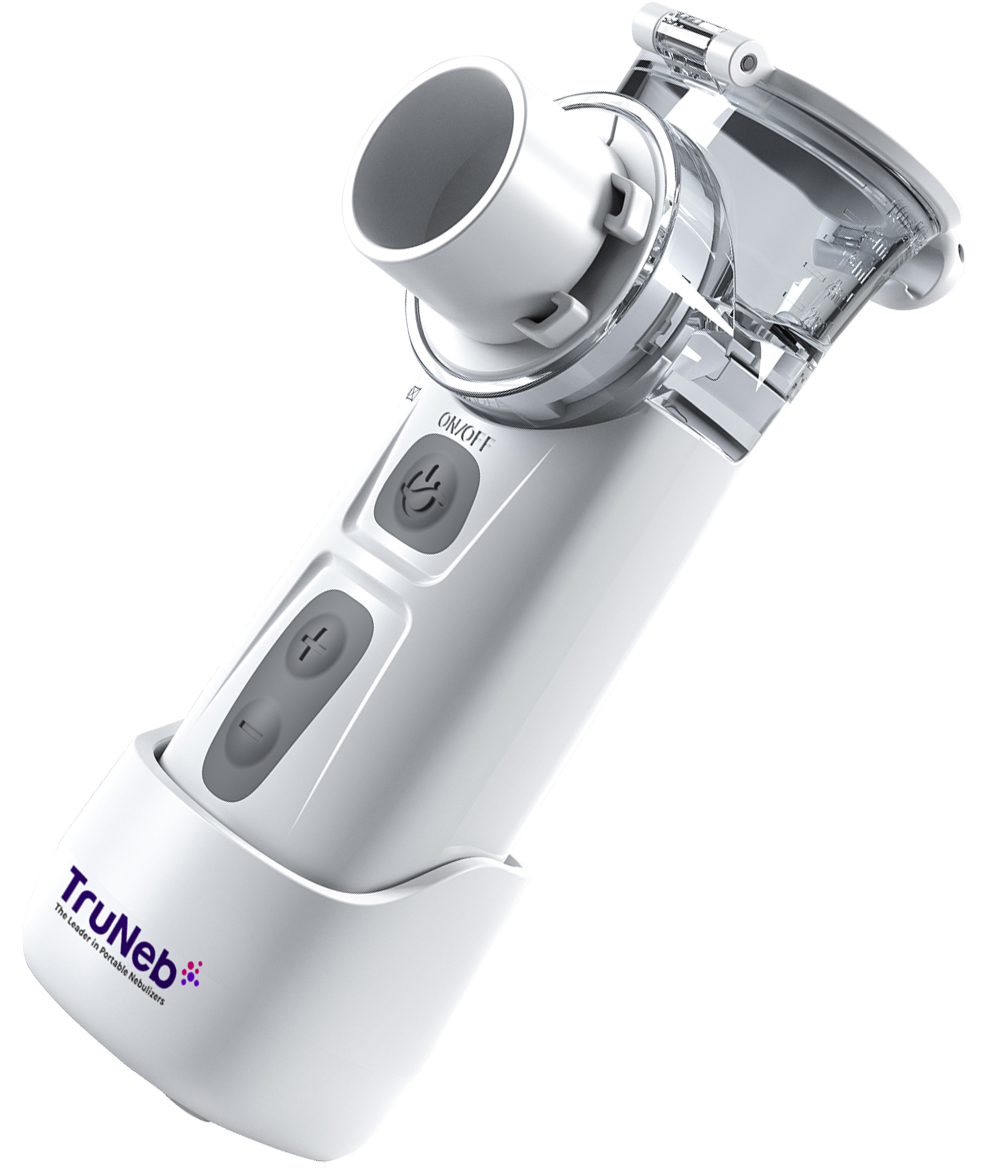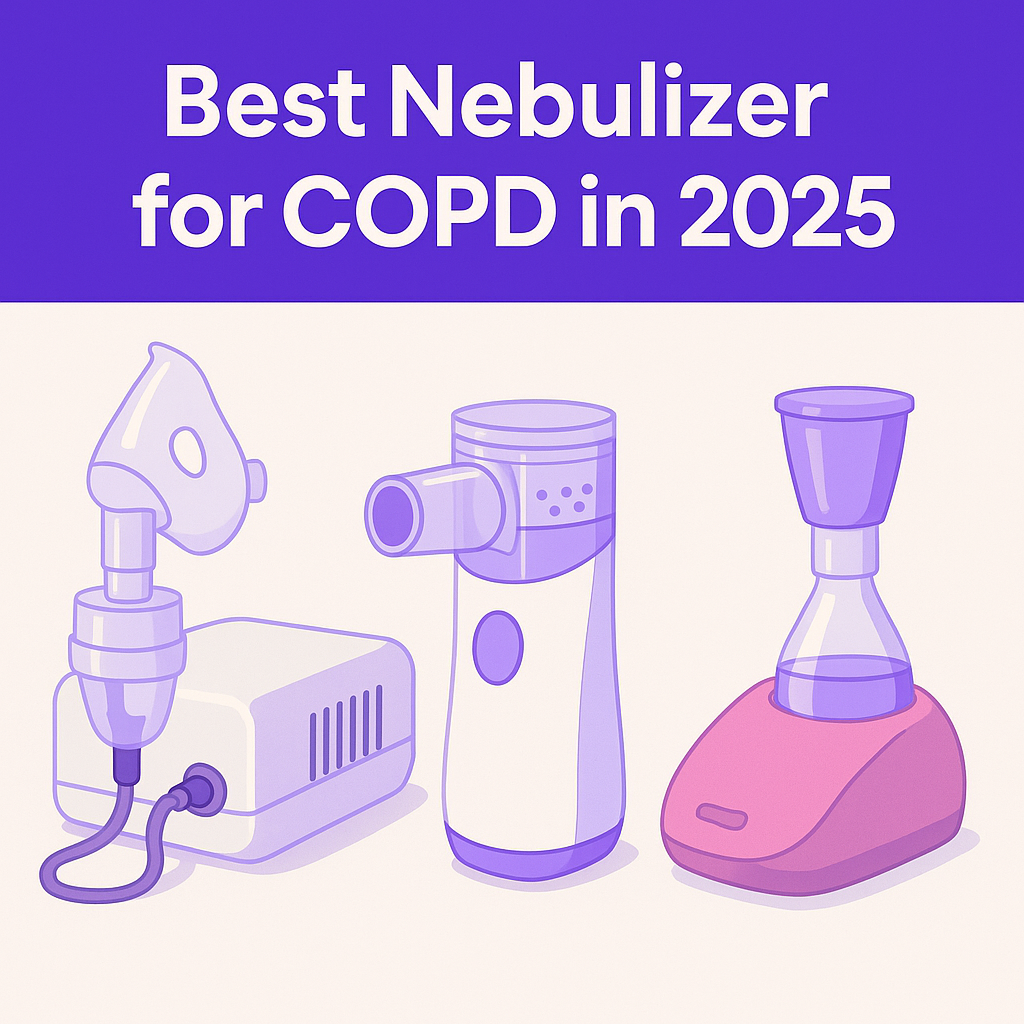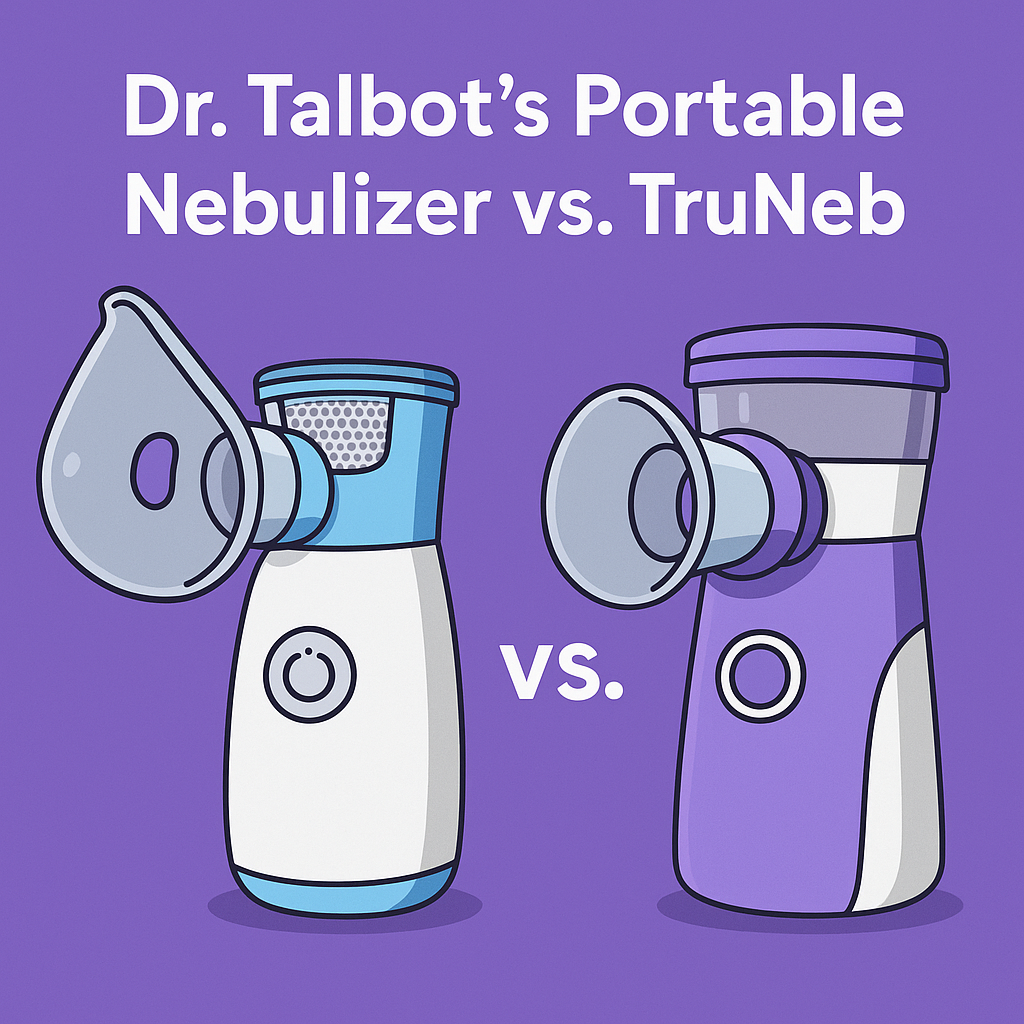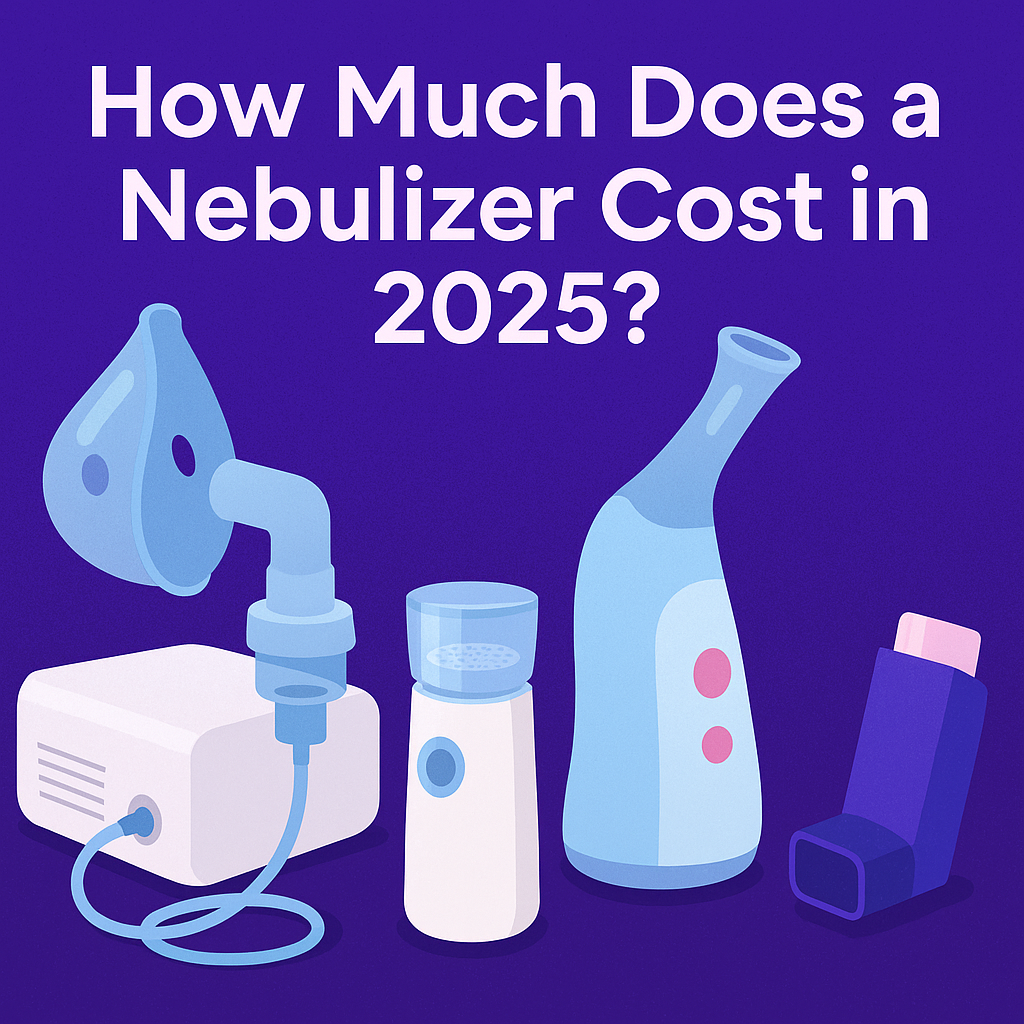On this page
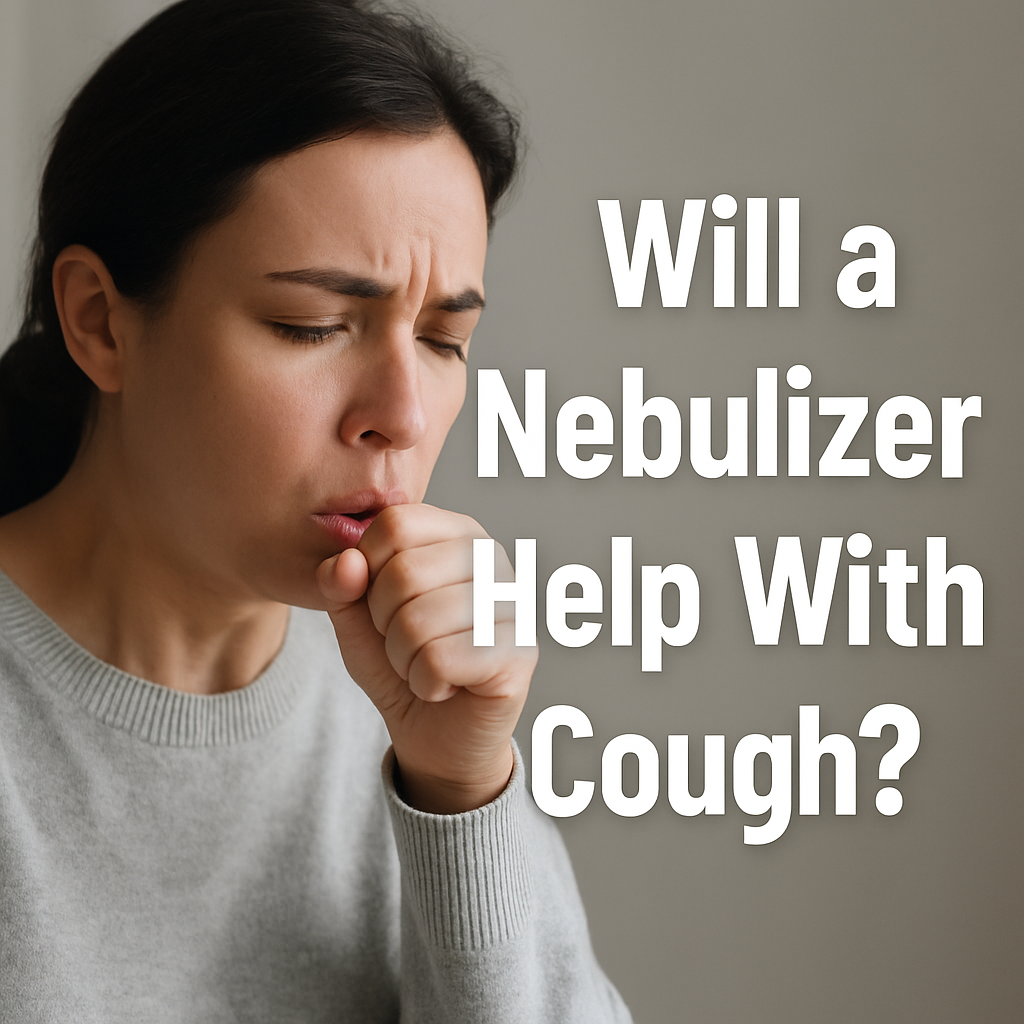
Few things are more exhausting than dealing with a persistent cough. You try to sleep, but the coughing keeps jolting you awake. You try to work, but every sentence is interrupted by that stubborn tickle in your throat. No matter how much water you drink or how many cough drops you pop, the relief is temporary — and the cough keeps hanging on.
If this sounds familiar, you might be wondering: Will a nebulizer help with a cough?
In many cases, yes. Especially when your cough is tied to a respiratory issue like asthma, bronchitis, or airway inflammation, a nebulizer can deliver soothing mist directly into your lungs to relieve cough symptoms and make breathing easier.
A nebulizer device works by turning medication or saline into an inhalable mist, allowing you to gently breathe the treatment deep into your airways without needing to coordinate a strong inhalation.
In this guide, we’ll break down when and how inhaling medication through a nebulizer can ease a stubborn cough — and when it might not be the right tool — so you can get closer to breathing (and sleeping) comfortably again.
How a Nebulizer Helps Relieve Cough Symptoms
When you’re dealing with a stubborn cough, a nebulizer can be a powerful tool for relief.So how exactly does it work?
A nebulizer device turns liquid medication or saline into a fine mist you inhale deeply into your lungs. This mist can directly soothe your airways, reduce inflammation, and help break up the mucus that’s causing your cough.
Here’s how nebulizer treatments help ease coughing symptoms:
- Loosens mucus: A nebulizer can break up thick mucus in your chest (with solutions like hypertonic saline for nebulizers), making it easier to cough up and clear your airways.
- Reduces airway inflammation: Medications delivered through a nebulizer, like bronchodilators or steroids, can reduce swelling in your bronchial tubes and ease the cough reflex.
- Opens airways to ease breathing: Certain nebulizer drugs for cough — like albuterol — help relax the muscles around your airways (a process called bronchodilation), relieving chest tightness and wheezing.
The benefits of a nebulizer for cough can make breathing feel easier and help restore better airflow when coughing is triggered by lung irritation, mucus buildup, or asthma flare-ups.
It’s important to understand that while nebulizers can effectively manage cough symptoms, they don’t treat the underlying cause of the cough itself.For example, if your cough is due to a viral infection like a cold or the flu, using a nebulizer won’t eliminate the virus — but it can still help you feel better while your body heals.
Will a Nebulizer Help With Cough? When It Is (and Isn't) Helpful
While a nebulizer can be incredibly effective for easing a persistent cough, it isn’t the right solution for every type of cough. Understanding when it helps and when it might now can save you time, frustration, and unnecessary treatments.
Asthma or COPD-Related Coughs
If your cough is caused by asthma or chronic obstructive pulmonary disease (COPD), a nebulizer is often a go-to tool. Nebulizers deliver rescue treatments like bronchodilators directly into your lungs, helping open narrowed airways, reduce wheezing, and calm the asthma cough fast.Many doctors prescribe nebulizer therapy for these conditions because it provides quick relief when airways become tight and coughing flares up.
Bronchitis or Severe Chest Colds
In cases of acute or chronic bronchitis, nebulizers can be incredibly helpful. With medications like hypertonic saline, They help break up mucus deep in the lungs, making it easier to clear congestion and soothe the cough.Doctors often prescribe nebulizers during bronchitis flare-ups or severe chest colds with heavy chest congestion.
However, if you just have a mild cold without much chest involvement — and your cough is dry and tickly — a humidifier and rest might be all you need. Nebulizer treatments are typically reserved for more stubborn, mucus-heavy coughs.
Postnasal Drip or Allergy Coughs
If your cough is from postnasal drip or allergies, a nebulizer might not always be necessary.Using a saline nebulizer for cough (with just 0.9% normal saline) can sometimes soothe irritated airways by adding moisture and helping clear mild mucus.It won't stop the underlying allergies, but it can ease some of the throat irritation caused by constant dripping.
Croup and RSV in Children
In pediatrics, nebulizers are widely used for treating croup and RSV when a child develops a barking cough or struggles with noisy breathing.Healthcare providers sometimes administer saline, epinephrine, or steroid nebulizer treatments to reduce airway swelling and improve breathing.
Although our focus here is adults, it’s reassuring to know that nebulizers are a trusted respiratory tool even in delicate cases like infant RSV.
When a Nebulizer Might Not Help
Not all coughs benefit from nebulizer treatments. If your cough is dry, tickly, and seems to be coming from your throat, a nebulizer won’t offer much relief. Soothing home remedies like warm tea, lozenges, humidifiers, or steam showers might be more appropriate.
Nebulizers are best coughs related to lung congestion, asthma, bronchitis, or airway inflammation — where reaching the lower respiratory tract is critical.
Can a Nebulizer Make a Cough Worse?
Less commonly, certain nebulizer medications like hypertonic saline, atrovent, or albuterol can cause temporary side effects such as throat irritation or jitteriness, which might make coughing feel worse right after treatment.
These side effects usually pass quickly. If your symptoms worsen after nebulizer use, it’s important to talk to your doctor to adjust your treatment plan. Always get medical attention immediately if you experience difficulty breathing.
See a Doctor First
Always check with your healthcare provider before starting any new breathing treatments at home, especially if you're dealing with other symptoms like fever, chest pain, or difficulty breathing. A physician will prescribe the appropriate medication for your condition.
What Can You Nebulize for a Cough? (Medications & Solutions)
What to Put in a Nebulizer for a Cough
What you put into the nebulizer is what determines how well it will help relieve your cough.
Depending on your symptoms and diagnosis, here are the most common nebulizer medications and solutions used to ease a cough:
Bronchodilators (Like Albuterol)
For coughs caused by tight, narrow airways (bronchospasm) like during an asthma or a COPD flare — bronchodilators work best.A common example is albuterol for cough relief (also known by the brand name Ventolin).Albuterol relaxes the muscles around your bronchioles, helping to open airways quickly and ease coughing, wheezing, and chest tightness. This type of nebulizer treatment is fast-acting but requires a prescription from your doctor.
Steroid Solutions (Like Budesonide)
Conditions like chronic bronchitis and asthma can cause long-term airway inflammation. A doctor may prescribe a steroid medication like budesonide for nebulizer use.Steroids work differently from bronchodilators: they reduce inflammation inside the airways over time, helping to prevent frequent or severe coughing bouts.
While steroid nebulizers don't provide instant relief, they are crucial for managing persistent cough caused by chronic lung conditions. Like bronchodilators, steroid solutions are prescription-only.
Hypertonic Saline (Saline Nebulizer for Cough)
When the goal is simply to loosen mucus and calm irritated airways, hypertonic saline can be nebulized. Hypertonic saline is a sterile saltwater solution, typically available in 3% or 7% concentrations. It’s drug-free and works by drawing moisture into the air passages, thinning out thick mucus, and making it easier to cough it up.A saline nebulizer for cough can significantly ease coughing caused by chest congestion, bronchiolitis (especially in children), or chronic respiratory illnesses like cystic fibrosis.
One major advantage? Saline solutions are available over-the-counter, making them more accessible for home care after discussing with your healthcare provider. For example, TruNeb™ offers high-quality medical-grade saline solution for convenient at-home use.
Other Nebulized Treatments (Lidocaine, Antibiotics)
In rare cases — like when someone has a severe infection or a stubborn, refractory cough — a doctor might prescribe lidocaine nebulizer treatments or inhaled antibiotics.A lidocaine nebulizer for cough is sometimes used to numb the airways and reduce the cough reflex in very specific medical scenarios. However, these treatments are niche and highly specialized. They shouldn’t be attempted without a prescription from a doctor.For most coughs, bronchodilators, steroids, or saline are the standard for nebulizer therapy.
Quick FAQ: Can You Put Plain Water in a Nebulizer?
No, you should never use plain water in a nebulizer. Plain or distilled water doesn't match your body's salt balance and can actually irritate your lungs. Instead, always use sterile saline solutions designed for nebulizer use.
Step-by-Step: Using a Nebulizer for Cough Relief
If you’re new to using a nebulizer, don’t worry! The process is simple once you get the hang of it. Here’s a clear, step-by-step guide on how to use a nebulizer to help relieve your cough.
1. Set Up the Device
First, assemble the parts of your nebulizer.Most nebulizer kits include a compressor machine, tubing, a medicine cup, and a mouthpiece or mask. Portable models like the TruNeb™ Portable Nebulizer work great too.
- Connect one end of the tubing to the compressor and the other end to the medicine cup.
- Attach the mouthpiece or mask to the top of the medicine cup.
- Make sure all connections are snug to avoid air leaks.
2. Add the Medication or Solution
Wash your hands to prevent contamination. Then carefully measure your prescribed nebulizer medication or saline solution into the medicine cup, following your doctor’s instructions. Your vial likely has a premeasured dose in it already.
- If you're using a prescribed medication (like albuterol or a steroid), always follow the exact dosage provided.
- If you're using over-the-counter saline for a simple saline nebulizer treatment, double-check the concentration (e.g., 3% or 7%) and volume your doctor recommended for your cough.
Never guess dosages without consulting your doctor. Even saline concentrations can matter for effective and safe inhalation.
3. Inhale the Mist
Turn on the nebulizer and make sure a visible mist starts flowing out of the mouthpiece or mask.
- Place the mouthpiece between your lips, sealing tightly, or fit the mask snugly over your nose and mouth.
- Breathe normally and deeply. Try not to rush your breathing. Take slow, steady inhalations help the mist reach deep into your lungs.
- Treatment sessions usually take between 5 and 15 minutes, depending on the amount of solution used and the strength of your nebulizer. Portable mesh nebulizers typically are the fastest and deliver the most medication to your lungs.
If you feel lightheaded, pause for a moment. Breathing too quickly can sometimes cause dizziness when inhaling medication mist rapidly.
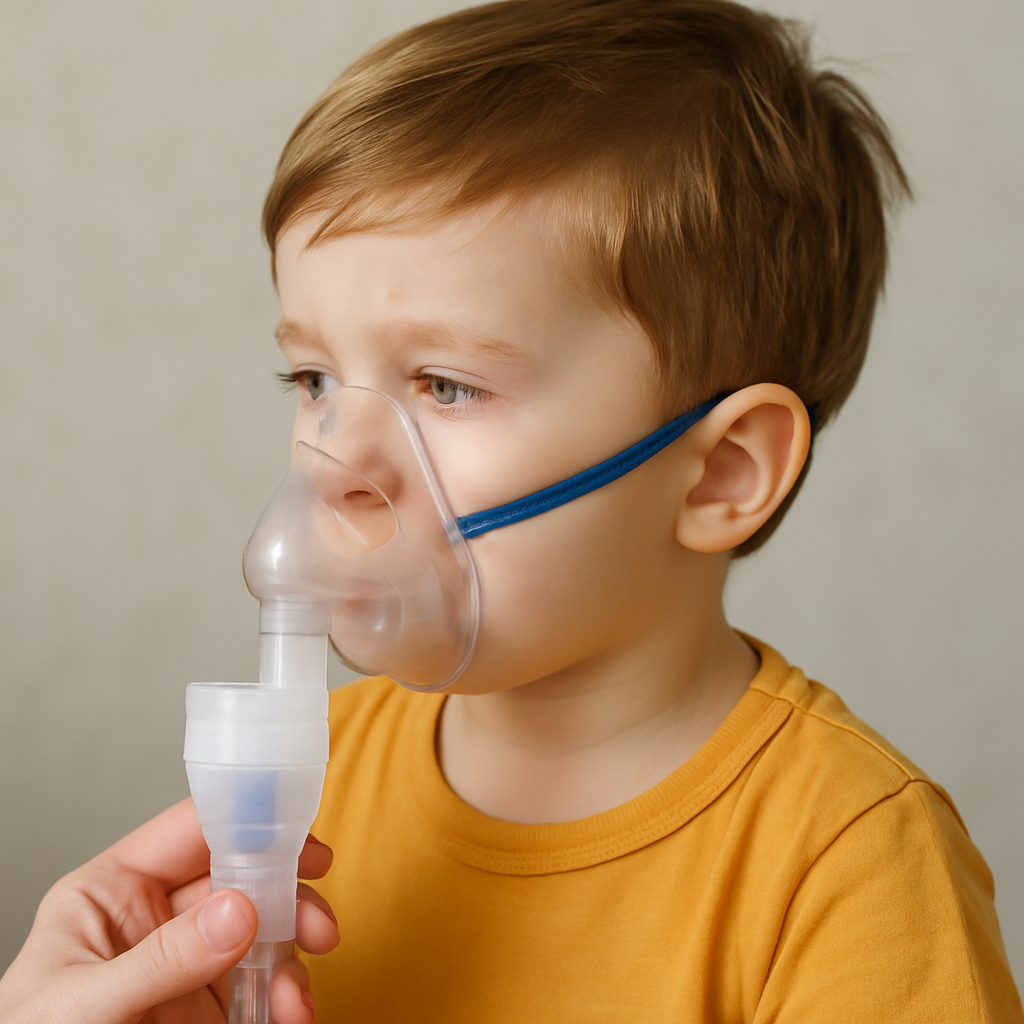
4. Finish Up Your Treatment
Once the liquid is completely nebulized and no mist remains:
- Turn off the machine.
- If you used a steroid medication like budesonide, rinse your mouth thoroughly with water afterward. (This step helps prevent mild side effects like oral thrush or yeast infections.)
- If you experience slight tremors, a faster heartbeat, or mild throat dryness — common nebulizer side effects with medications like albuterol — rest and monitor. These symptoms usually pass quickly. If you feel extreme shakiness, chest pain, or intense dizziness, contact your doctor right away. A substitute medication may be ordered with less side effects.
5. Clean the Nebulizer After Each Use
Keeping your nebulizer clean is very important to prevent infections:
- Pour out any leftover solution from the medicine cup immediately after your treatment.
- Wash the medicine cup, mouthpiece, and mask in warm, soapy water if you have a traditional one. For mesh nebulizers, nebulize distilled water in the medicine cup to clean the mesh.
- Rinse your jet nebulizer thoroughly. For a portable neb, ensure no moisture is left in the chamber.
- Air dry the parts by lying them on a clean paper towel
At least once a week, do a deeper disinfect:
- For a jet nebulizer, soak the parts (excluding tubing) in a vinegar-water solution (one part vinegar to three parts water) for about 30 minutes, then rinse well and let air dry.
- For a portable nebulizer, add several drops of white vinegar to 3 ml distilled water and nebulize it until it’s gone. Then nebulize 2 ml of distilled water to finish it off. Let it air dry.
- Always follow your manufacturer’s specific cleaning instructions for best results.
Also: never share your nebulizer mouthpiece or mask with others to avoid spreading germs.
When Will a Nebulizer Help With Cough? Signs You Need to See a Doctor
So, when will a nebulizer help a cough? Though it can help relieve cough symptoms, you should recognize when home treatments aren’t enough. If your persistent cough isn’t improving or it’s getting worse, it could be a sign that you need medical attention.
Here are clear cough warning signs that mean it’s time to schedule a doctor visit:
- Your cough lasts longer than 2–3 weeks:A lingering cough could point to an underlying condition like asthma, chronic bronchitis, or another respiratory issue that needs targeted treatment.
- You develop a high fever or cough up unusual mucus:If your cough is accompanied by a high fever, or you're coughing up thick yellow, green, or bloody mucus, it could indicate a serious infection that needs medical care.
- You experience shortness of breath or chest pain:Difficulty breathing, chest tightness, or sharp pains when coughing are red flags that require immediate evaluation by a healthcare provider.
- The nebulizer isn’t helping, or symptoms are worsening: If you've been using a nebulizer consistently but the coughing is getting worse, it’s time to reassess with a doctor.
Remember, nebulizers are supportive therapy! They’re designed to help manage symptoms like mucus buildup, airway irritation, and coughing — but they don't treat the root cause of illnesses like pneumonia, bacterial bronchitis, or severe asthma exacerbations.In many cases, additional treatments like antibiotics, corticosteroids, or inhaler adjustments may be needed to truly resolve the issue.
A visit to your provider can help identify what’s behind the ongoing cough. Depending on your symptoms, your doctor may:
- Order a chest X-ray
- Perform lung function tests
- Adjust your current medications
- Prescribe antibiotics or antifungals if an infection is found
The bottom line:If home nebulizer treatments aren't improving your cough within a reasonable time, seek professional medical attention. Getting the right diagnosis early makes a huge difference and can help you get back to breathing easy again.
Will a Nebulizer Help With Cough? Yes, With the Right Tools
A cough that won’t improve can wear you down physically and emotionally. When coughing fits make it hard to sleep, focus, or even catch your breath, having the right tools at your side can make all the difference.
Will a nebulizer help with a cough? Nebulizer treatments can be an effective way to manage cough symptoms — helping you loosen mucus, calm airway irritation, and breathe more easily while your body heals. Whether you’re using prescribed nebulizer medications like albuterol or a simple saline nebulizer solution for mild congestion, inhaling mist directly into your lungs can offer real, meaningful relief.
That said, it’s important to remember that a nebulizer isn’t a cure-all. It’s one part of a larger care plan — one that should always involve talking with your doctor if your cough doesn’t improve, worsens, or comes with concerning symptoms.Today’s nebulizers are quieter, smaller, and easier to use than ever before, giving you the freedom to manage your respiratory symptoms anywhere without hassle.
Find Relief with TruNeb™
For a reliable, portable option, TruNeb™ offers a lightweight nebulizer device that’s simple to use for both adults and kids. No bulky compressors. No loud motors. Just quiet, effective relief you can have at home or on the go.
We also offer medical-grade saline solutions for helping with excess mucus that feels stuck in your lungs.

